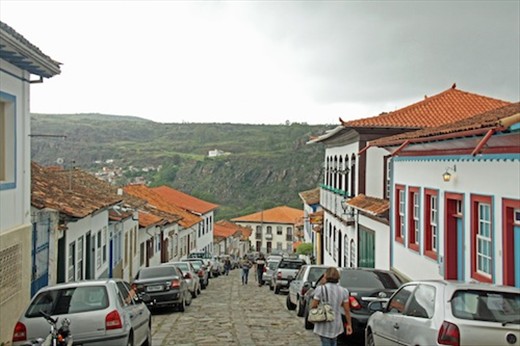Conferring World Heritage status on a historic town provides funds to help insure its preservation. But the money comes - or should, at least - with certain guidelines and restrictions.
For instance, Lonely Planet raves, "isolated but fabulous, Diamantina is one of Brazil's prettiest and least-visited colonial towns ... (whose) fine mansions and winding streets haven't changed much in 200 years." In truth it's hilly cobblestone streets are packed cheek-to-jowel with parked cars and those colonial buildings are bedecked with satellite dishes, not the pizza-sized ones but the giant kind that could receive signals from the big bang. The highlight of our visit was listening to podcasts from BBC 4 about astro-physics, travel and mathematics theory on the long bus ride. And Pousada Seresta was a simple, and friendly place to wait out the rain and listen to the thunder rumble through the hills.

Diamantia, not the WHS spirit
I once complained about satellite dishes to a waiter in Prague. He admonished "We don't live our lives so you have a place to come on holiday!" Touche. But "progress" comes with a cost and, as Joni Mitchel sang, "You don't know what you've got till it's gone."
The bus trip from Brasilia to Cidade de Goias was even longer, requiring a couple of nights in Goiania. It's Carnival time and we couldn't get lodging so it was an out and back day. In fact we weren't even certain we could get seats on the bus back. Our loss, because Cidade de Goias was the charming kind of town that we could have spent some time in, a place of pastel buildings, cobbled streets and plazas full of friendly people in a mood to party. There was no parking in the historic center, in fact few cars. And not a satellite dish in sight.